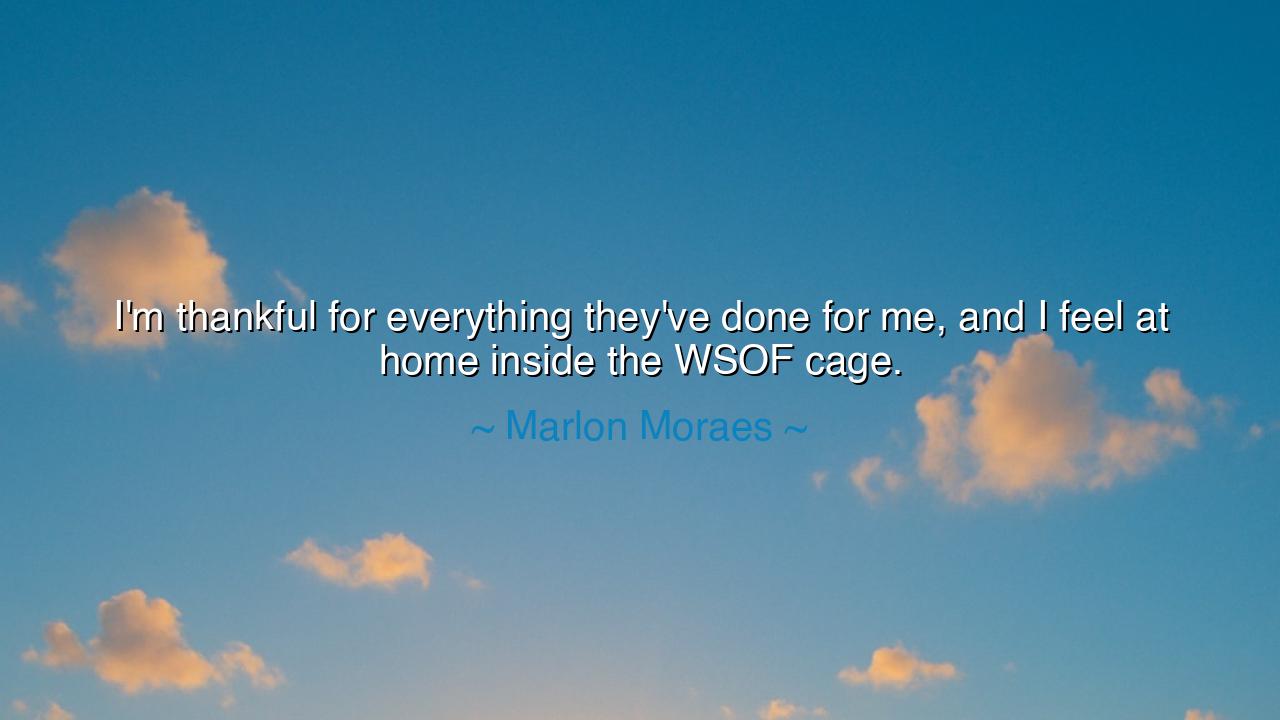
I'm thankful for everything they've done for me, and I feel at
I'm thankful for everything they've done for me, and I feel at home inside the WSOF cage.






Marlon Moraes once spoke with the heart of a warrior: “I’m thankful for everything they’ve done for me, and I feel at home inside the WSOF cage.” These words, though forged in the world of combat sports, carry a truth that transcends the walls of the arena. They remind us that gratitude and belonging are as essential to the fighter’s spirit as strength and skill. For even in a place of struggle and danger—the cage, the battlefield, the trial—one may still discover the warmth of home, if love, loyalty, and respect are present.
The ancients knew this paradox well. The Spartans, hardened for war from youth, found their sense of home not only within the walls of their city, but also upon the battlefield where they stood shoulder to shoulder with their brothers. The shield wall was their hearth, and the clash of steel their song. Moraes’ declaration that he feels “at home” in the cage is not unlike this ancient truth: that the warrior’s heart finds peace not in avoiding the struggle, but in embracing it as the place where destiny unfolds.
His words also speak of thankfulness—a virtue often forgotten in the tales of champions. Many warriors boast of their own strength, forgetting the hands that trained them, the voices that encouraged them, and the sacrifices of those who built the path. Moraes, however, humbles himself, acknowledging those who stood behind him. In this, he echoes the wisdom of Alexander the Great, who once declared, “I am indebted to my father for living, but to my teacher for living well.” For no man, however mighty, ascends alone. Gratitude is the seal of true greatness.
Consider also the image of the cage. To the untrained eye, it is a prison, a place of confinement. But to the fighter, it is a sanctuary of purpose. Within those walls, all distractions fall away, and only truth remains: the truth of preparation, of courage, of heart. So too in life, many places that seem like cages—our struggles, our responsibilities, our burdens—may, when embraced with the right spirit, become places of strength and belonging. The true warrior does not flee from the cage; he learns to call it home.
The deeper meaning of Moraes’ words is therefore both personal and universal. To be thankful is to acknowledge that our journey is woven with the hands of many. To feel at home even in the arena of struggle is to conquer fear, to transform hardship into a dwelling place of strength. This is not merely the spirit of a fighter, but of all who face trials in their own lives. For whether one’s cage is a ring of combat, a workplace of duty, or the daily struggles of survival, one may still claim it as home by embracing it with courage and gratitude.
The lesson here is clear. Do not despise the place of your struggle, for it may be the very ground upon which your destiny is shaped. Do not forget to honor those who support you, for their unseen sacrifices are the foundation of your triumphs. And when fear whispers that you are trapped, remember Moraes’ wisdom: even within the walls of the cage, you may find belonging, peace, and purpose.
Practical actions may be taken. Begin each day with an act of thankfulness—for teachers, for family, for opportunities. Reframe your struggles not as prisons, but as proving grounds. And when you face your own battles, enter them not with dread, but with the heart of one who feels at home in the very place where others might feel trapped.
Thus Moraes’ words, born in the roar of the arena, echo as eternal wisdom: “I’m thankful… and I feel at home inside the cage.” Let us remember that life itself is such a cage—at times harsh, at times confining, but also the place where we discover who we truly are. And if we face it with gratitude and courage, we too will find that even in struggle, we can be at home.






AAdministratorAdministrator
Welcome, honored guests. Please leave a comment, we will respond soon